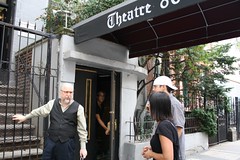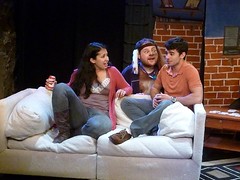Earlier today we shared some snaps of Model Ts lined up outside of John’s of 12th for the ongoing “Boardwalk Empire” shoot. Well, now there’s more of ’em! And they’re moving! Above: footage of the buggies purring as extras in old-time garb practice their Prohibiton-era struts.
PROHIBITION
Care to Drink in Some Theater?
By DANIEL MAURERHaving trouble getting the boyf to take in some local theater? This might convince him. “The Vitology,” a new three-act comedy from Ben Clawson, Artome Yatsunov, and Scott Cagney – playwright, director, and actor from “Claire Went to France” – involves a drinking game: audience members pick a character and every time the character drinks, they drink, too. The play, which runs July 5 to 14 at Under St. Marks, spans “a decade in the lives of the world’s worst best friends,” per a press release, so expect to take many a sip from the free beer you get with the $18 cost of admission.
And the Strange Dog Theatre Company isn’t the only one plying theatergoers with drinks. Bowery Boogie attended “Speakeasy Dollhouse,” Cynthia von Buhler’s new play about the murder of her saloonkeeper grandfather and found that upon arriving at the former Lower East Side speakeasy where the play takes place, audience members are offered cannolis and “special coffee.”
A Look at Prohibition’s Local Past
By MAYA MILLETT Maya Millett Lorcan Otway guides a tour of prohibition enthusiasts towards the gangster museum, located on the upper level of Theater 80.
Maya Millett Lorcan Otway guides a tour of prohibition enthusiasts towards the gangster museum, located on the upper level of Theater 80.Long before the Beat poets, the Warhol kids, free-spirited artists and musicians came to define the East Village’s bohemian scene, a different kind of character dominated the streets: the neighborhood bootlegger.
During the height of the 1920s Prohibition era, New York City served as the American gangster’s playground. Behind ordinary storefronts and in dingy back alleyways, men and women thirsty for forbidden libations and the prospect of a good time crept up to nondescript doors and slipped into another world. At the height of the Jazz Age, America was ready to dabble in debauchery even in the East Village, where European immigrant families crowded into tenement buildings.
Unlike the glamorous settings depicted on the new HBO series “Boardwalk Empire” the face of the speakeasy owner here was often not a wily gangster, but a German shopkeeper or a Jewish teacher. For these East Villagers, starting a speakeasy was as easy as opening their homes for an afternoon to sell alcohol. The illegal booze was snagged through a number of enterprising means — whether through dealings with a local bootlegger or grabbing what they could from a stalled truck transporting the stuff. “It was just kind of a buyer’s market — bootleggers were slipping menus underneath doors like Chinese food menus.”
Read more…




